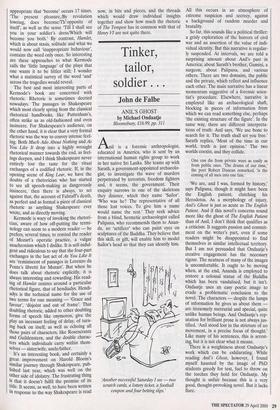Tinker, tailor, soldier . . .
John de Falbe
ANIL'S GHOST by Michael Ondaatje Bloomsbury, £16.99, pp. 311 Aiil is a forensic anthropologist, educated in America, who is sent by an international human rights group to work in her native Sri Lanka. She teams up with Sarath, a government-appointed archaeolo- gist, to investigate the wave of murders perpetrated by terrorists, freedom fighters and, it seems, the government. Their enquiry narrows to one of the skeletons they disinter, which they name 'Sailor'. 'Who was he? The representative of all those lost voices. To give him a name would name the rest.' They seek advice from a blind, hermetic archaeologist called Palipana, who recommends them to Anan- da, an 'artificer' who can paint eyes on sculptures of the Buddha. They believe that this skill, or gift, will enable him to model Sailor's head so that they can identify him.
'Another successful Saturday I see — two scratch cards, a lottery ticket, a football coupon and four betting slips.' All this occurs in an atmosphere of extreme suspicion and secrecy, against a background of random murder and brutality.
So far, this sounds like a political thriller: a grisly exploration of the horrors of civil war and an assertion of the value of indi- vidual identity. But this narrative is regular- ly suspended. At intervals, we are told a surprising amount about Anil's past in America; about Sarath's brother, Gamini, a surgeon; about Palipana, and various others. There are two domains, the public and the private, which reflect and influence each other. The main narrative has a linear momentum suggestive of a forensic scien- tist's procedure. Elsewhere, narrative is employed like an archaeological shaft, blocking in pieces of information from which we can read something else, perhaps 'the existing structure of the figure'. In the same way, there are different interpreta- tions of truth: Anil says, 'We use bone to search for it. The truth shall set you free.' Sarath replies, 'Most of the time in our world, truth is just opinion.' The two worlds coexist, and they collide.
One can die from private woes as easily as from public ones. 'The drama of our time,' the poet Robert Duncan remarked, 'is the coming of all men into one fate.'
'We are, and I was, formed by history,' says Palipana, though it might have been the English patient, clutching his Herodotus. As a morphology of injury, Anil's Ghost is just as acute as The English Patient. And if this novel's concerns sound more like the ghost of The English Patient than of Anil, I don't think that qualifies as a criticism. It suggests passion and commit- ment on the writer's part, even if some readers might be disappointed to find themselves in similar intellectual territory. But I am not persuaded that Ondaatje's creative engagement has the necessary rigour. The neatness of many of the images is uncomfortable. It ought to be moving when, at the end, Ananda is employed to restore a colossal statue of the Buddha which has been vandalised, but it isn't. Ondaatje uses an easy poetic image to evade a problematic conclusion to the novel. The characters — despite the lumps of information he gives us about them — are tiresomely mercurial and special, quite unlike human beings. And Ondaatje's rep- utation for brilliant prose is not always jus- tified. 'Anil stood lost in the stricture of no movement, in a precise focus of thought.' Like many of his sentences, this is arrest- ing, but it is not clear what it means.
There is a weightiness about Ondaatje's work which can be exhilarating. While reading Anil's Ghost, however, I found myself haunted by the image of PhD students greedy for text, fuel to throw on the torches they hold for Ondaatje. My thought is unfair because this is a very good, thought-provoking novel. But it lacks flare.


























































 Previous page
Previous page